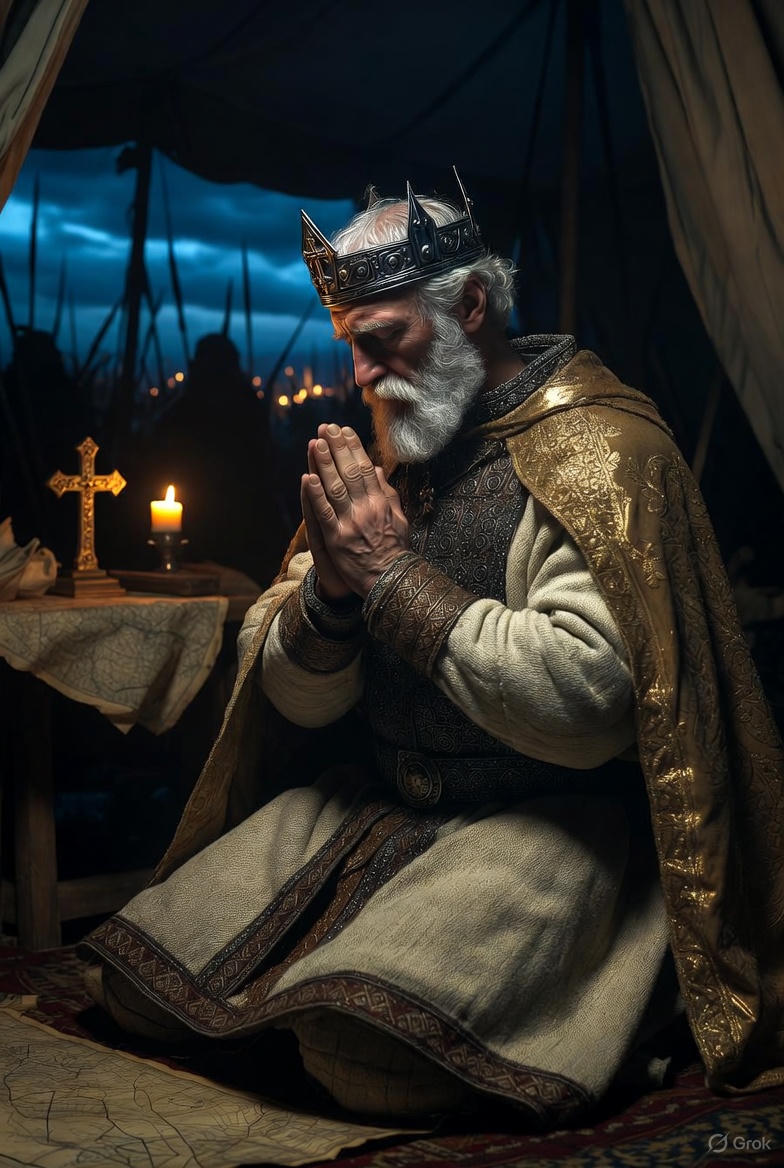Research suggests that the Battle of Winwaed on November 15, 655 AD, represented a pivotal clash between pagan and Christian forces in early Anglo-Saxon England, where a smaller Northumbrian army overcame overwhelming odds against the Mercians. It seems likely that this event accelerated the decline of paganism in Britain, highlighting themes of strategic adaptation and faith amid adversity. The evidence leans toward viewing it as a turning point that unified Northumbria while fragmenting Mercia, though interpretations vary on its exact location and long-term religious impacts.
### Key Historical Insights
– **Underdog Victory Against Odds**: King Oswiu’s outnumbered forces defeated the dominant Mercian army led by the last major pagan king, Penda, emphasizing how preparation and terrain can shift battles.
– **Role of Faith and Vows**: Oswiu’s pre-battle prayer and pledge to dedicate his daughter to monastic life if victorious underscore the interplay of spirituality and resolve in historical outcomes.
– **Environmental Factor in Defeat**: Heavy rains caused flooding, leading to more Mercian deaths from drowning than combat, illustrating how external elements can influence even well-planned strategies.
– **End of an Era**: The battle’s result contributed to the Christianization of Mercia, marking a cultural shift, though some debate the extent of immediate religious change versus political realignment.
### Applying Lessons to Modern Life
The Battle of Winwaed offers relatable insights for personal growth, such as embracing adaptability in challenges and leveraging inner strength. While historical contexts differ, its themes of resilience can inspire everyday decisions without oversimplifying complex events.
### Potential Benefits Today
Individuals might draw from this to navigate personal “battles,” like career setbacks or health issues, by focusing on strategic planning and mindset shifts.
In the misty annals of early medieval England, few events capture the raw interplay of power, faith, and fate quite like the Battle of Winwaed. Fought on a rain-soaked November day in 655 AD, this confrontation between the kingdoms of Mercia and Northumbria not only reshaped the political landscape of Anglo-Saxon Britain but also symbolized the waning of pagan traditions in the face of emerging Christianity. To understand its profundity, we must delve deep into the fractured world of seventh-century England, where tribal allegiances, royal ambitions, and religious ideologies collided in a saga of conquest and survival.
The Anglo-Saxon period, spanning roughly from the fifth to the eleventh centuries, was a time of migration, settlement, and ceaseless warfare. Following the Roman withdrawal around 410 AD, waves of Germanic tribes—Angles, Saxons, and Jutes—crossed the North Sea to establish kingdoms across what is now England. By the mid-seventh century, these had coalesced into several major powers: Northumbria in the north, Mercia in the Midlands, East Anglia, Wessex, Kent, and others. This era, often romanticized as the “Dark Ages,” was anything but stagnant; it buzzed with cultural exchanges, including the gradual spread of Christianity from Roman missionaries like Augustine of Canterbury, who arrived in 597 AD.
Northumbria, comprising the sub-kingdoms of Bernicia and Deira, was a powerhouse under kings like Edwin (616–633) and Oswald (634–642). Edwin’s conversion to Christianity in 627 AD, influenced by his marriage to the Christian princess Æthelburg of Kent, marked a significant milestone. Oswald, famed for his piety, invited Irish monks from Iona to evangelize, leading to the founding of Lindisfarne Monastery. Yet, Northumbria’s ascendancy was perpetually threatened by its southern neighbor, Mercia.
Mercia, under the iron-fisted rule of King Penda (c. 626–655), emerged as a formidable force. Penda, a staunch pagan, was no mere warlord; he was a master strategist who expanded Mercia through a series of calculated alliances and brutal campaigns. His reign began amid internal strife, but he quickly consolidated power, forging ties with Welsh kings like Cadwallon ap Cadfan of Gwynedd. In 633 AD, at the Battle of Hatfield Chase, Penda and Cadwallon defeated and killed Edwin of Northumbria, plunging the north into chaos. Edwin’s head was displayed as a trophy, a grim testament to Penda’s ruthlessness.
Penda’s paganism was not just personal; it was political. While Christianity gained traction in other kingdoms, Penda resisted, tolerating missionaries only insofar as they didn’t threaten his authority. He allowed his son Peada to convert in 653 AD as part of a marriage alliance with Northumbria, but Penda himself remained devoted to gods like Woden and Thunor. This stance made him a symbol of resistance against the encroaching Christian tide, earning him both allies among pagan holdouts and enemies in Christian courts.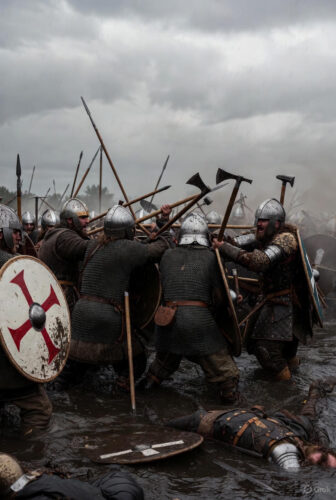
The roots of the Winwaed conflict trace back to 642 AD, when Penda slew Oswald of Northumbria at the Battle of Maserfield (or Oswestry). Oswald, venerated as a saint for his missionary zeal, died praying for his troops, his body dismembered and parts displayed on stakes—a common pagan ritual to harness the fallen king’s power. Oswald’s brother, Oswiu, ascended to the Northumbrian throne, inheriting a vendetta against Penda. For over a decade, Oswiu navigated precarious peace, even marrying his daughter Alchflaed to Penda’s son Peada to secure alliances. But tensions simmered.
By 655 AD, Penda, now in his seventies but undiminished in vigor, assembled a grand coalition. Sources like Bede’s “Ecclesiastical History of the English People” describe an army of thirty royal leaders, including Welsh kings like Cadafael ap Cynfeddw of Gwynedd and Æthelhere of East Anglia. This “thirty legions” likely exaggerated, but it underscored Mercia’s dominance. Penda’s motive? Perhaps to eliminate Northumbrian threats once and for all, or to extract tribute. He ravaged Northumbria, reaching as far as Bamburgh, Oswiu’s stronghold.
Oswiu, facing annihilation, offered tribute—gold, silver, jewels—but Penda refused, intent on total subjugation. With his forces vastly outnumbered (Bede calls them “perparvus,” very small), Oswiu turned to divine intervention. In a moment of desperation, he vowed to God: if granted victory, he would dedicate his infant daughter Ælfflæd to a nunnery and donate twelve estates for monasteries. This pledge, recorded by Bede, highlights the era’s blend of warrior ethos and Christian piety.
The battle unfolded near the River Winwaed, whose location remains debated. Traditional views place it near Leeds, where “Whinmoor” echoes “Winwaed,” but scholars like Andrew Breeze argue for the River Went near Doncaster, citing strategic retreat paths. Heavy November rains had swollen the river, turning the field into a quagmire—a detail that would prove fateful.
Penda’s army, confident in numbers, advanced, but internal fractures emerged. Oswiu’s nephew Æthelwald, king of Deira, initially guided the Mercians but withdrew, awaiting the outcome from safety. Cadafael of Gwynedd, later dubbed “battle-shirker,” deserted with his troops under cover of night. These betrayals weakened Penda’s flanks.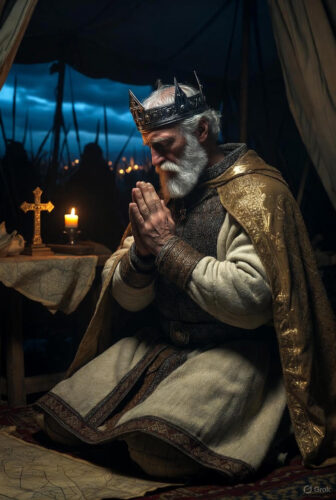
Details of the fighting are sparse, as Bede focuses on religious significance rather than tactics. Anglo-Saxon battles typically involved shield walls—dense formations of spearmen clashing until one broke. Cavalry was rare; most fought on foot with spears, swords, and axes. Oswiu’s smaller force likely used the terrain, perhaps ambushing or holding high ground. The Northumbrians charged with ferocity, breaking Mercian lines.
Penda fell in the melee, his body beheaded—a symbolic end for the pagan king. Panic ensued; retreating Mercians fled toward the flooded Winwaed. Bede notes more drowned than died by the sword, the river claiming lives in a biblical echo of divine judgment.
The aftermath was transformative. Oswiu claimed Mercia, installing Peada as sub-king, but Peada’s murder (allegedly by his Christian wife) led to direct Northumbrian rule until a Mercian revolt in 658 AD. Oswiu fulfilled his vow: Ælfflæd became abbess of Whitby, and monasteries like Hartlepool and Gilling arose on donated lands.
Religiously, Winwaed marked paganism’s nadir. Penda’s death removed the last major pagan ruler; Mercia Christianized rapidly under Oswiu’s oversight, with missionaries like Cedd and Diuma establishing sees. By 664 AD’s Synod of Whitby, Christianity dominated, aligning English churches with Rome.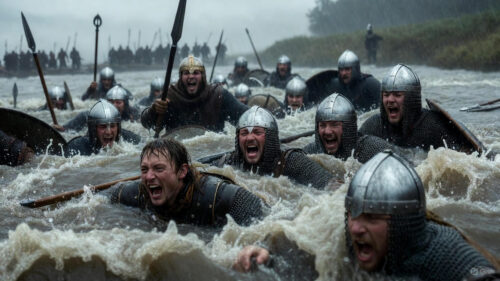
Politically, Northumbria peaked under Oswiu, influencing Pictland and Scotland. Yet, his death in 670 AD saw declines, with Mercia resurging under Wulfhere. Winwaed’s legacy endures in folklore; local legends speak of ghostly battles near proposed sites, and archaeological finds—like the Staffordshire Hoard—hint at the era’s turmoil.
Bede portrays Winwaed as a Christian triumph, but modern historians see nuanced motives: power struggles over ideology. Penda tolerated Christianity; his campaigns targeted rivals, not faith. Still, the battle accelerated conversion, paving for cultural unification.
Beyond history, Winwaed’s echoes offer timeless motivation. In an age of uncertainty, its tale of overcoming insurmountable odds through resolve, adaptation, and belief resonates. Imagine facing a “Penda” in life—a daunting challenge like job loss or illness. Oswiu’s story teaches that victory often lies in leveraging what you have: inner strength, strategic pauses, and unexpected allies.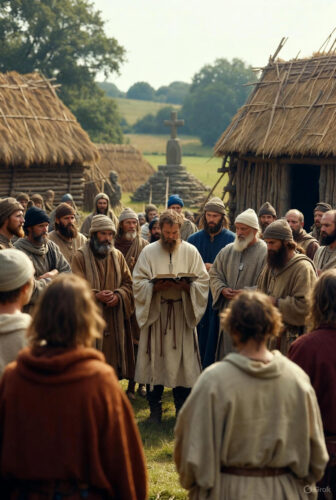
To apply this historically grounded wisdom personally, consider these specific bullet points:
– **Cultivate Inner Resolve Like Oswiu’s Prayer**: Start each day with a 10-minute reflection or meditation, affirming your goals and visualizing success, much as Oswiu sought divine aid before battle.
– **Adapt to Terrain in Challenges**: Assess obstacles like the flooded river—identify “floods” in your path (e.g., financial hurdles) and pivot strategies, such as upskilling via online courses to navigate career floods.
– **Build Alliances Amid Betrayals**: Forge networks despite setbacks; join a support group or mentorship program, echoing how desertions weakened Penda but strengthened Oswiu’s focus.
– **Embrace Turning Points for Growth**: After a “defeat,” dedicate time to renewal—volunteer or learn a hobby, akin to Oswiu’s monastic pledges fostering long-term stability.
– **Overcome Odds with Preparation**: Train incrementally for goals; if aiming for fitness, start with daily walks building to runs, mirroring Oswiu’s tactical use of smaller forces.
A practical plan to integrate these:
- **Week 1: Reflection Phase** – Journal daily about personal “battles,” noting strengths and vulnerabilities, inspired by Oswiu’s vow.
- **Week 2-4: Strategy Building** – Set three adaptable goals (e.g., career networking), track progress weekly, adjusting like battle terrain.
- **Month 2: Alliance Formation** – Connect with two mentors or peers, sharing experiences to build support against “Pendas.”
- **Ongoing: Renewal Rituals** – Monthly review achievements, dedicating time to self-care or giving back, ensuring sustained motivation.
- **Evaluation at 3 Months** – Assess outcomes, celebrate wins, and refine, turning historical inspiration into habitual triumph.
This blend of exhaustive historical detail—spanning kingdoms’ rises, kings’ ambitions, and battle’s minutiae—with motivational application makes Winwaed not just a distant echo but a vibrant guide.

